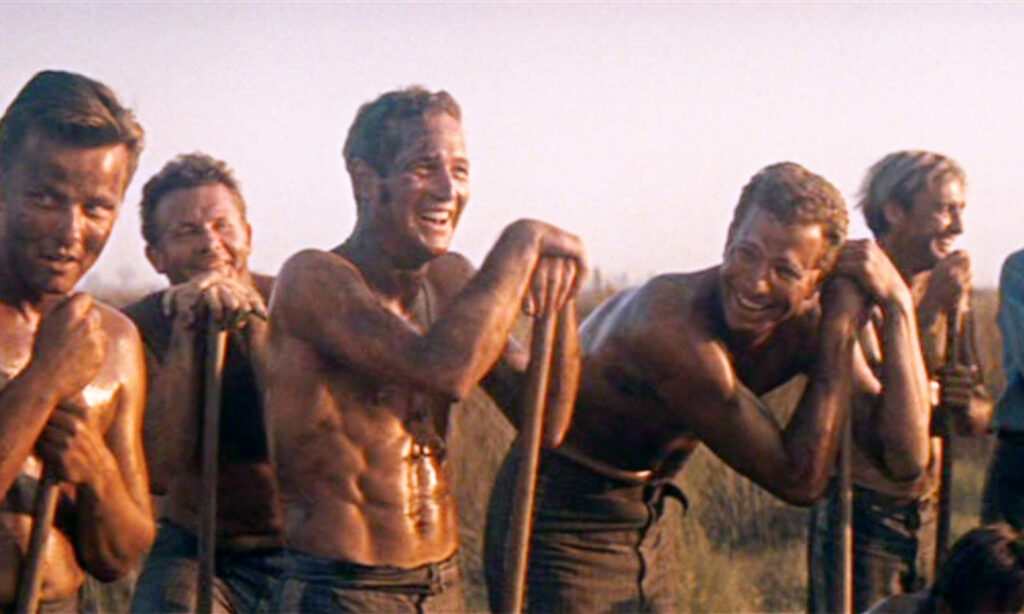Christ and “The Powers”
in “Cool Hand Luke”
Russell Pregeant

Christ and 'The Powers' in 'Cool Hand Luke'
by
Russell Pregeant

According to Colossians 2:15, through the cross of Christ God has disarmed “the rulers and authorities”—or, as Walter Wink has termed them, “the powers.” And there is no doubt that the central character in “Cool Hand Luke” functions as a Christ-figure who confronts brutal and oppressive powers—a fact made all the more poignant by the fact that Luke is a kind of “good old boy” (though also a highly decorated military veteran) who lands in prison on for decapitating a row of parking meters while drunk. The movie bubbles over with explicit Christian symbolism. For instance, after a hilarious scene in which Luke wins a bet that he could eat fifty boiled eggs, he lies down with his arms stretched out like Jesus on the cross. And at various points we hear him conversing with God in a way reminiscent of Jesus’s cry of dereliction on the cross. But whether Luke’s death constitutes a triumph over “the powers” symbolized by the oppressive prison officials depends on how one interprets the ending. Is there a hint of a “resurrection” that would have meaning for the followers he has found among his fellow prisoners, or is his victory only a personal, moral triumph in that he never gives in to the brutal system that he endured in prison? The latter is the opinion of one reviewer, but when I first saw the movie, I interpreted the ending very differently.
Luke is the quintessential anti-establishment hero. He bucks the prison system at every turn and endures the beastly punishments it dishes out. And early on, his independent manner brings him into conflict with the acknowledged leader of the prisoners. When their differences lead to a boxing match, the larger man, Dragline, beats him badly, but Luke’s dogged refusal to quit finally earns the respect of his opponent as well as of the other prisoners. He then becomes their leader with Dragline (Peter?) as his righthand man. His adventures take us on a journey through prison life that is comical but at the same time deeply disturbing, because we know that the brutalities Luke and the others endure reflect the realities of many a prison in an earlier era that are not unknown today.
The plot takes a more serious turn when Luke tries to escape, although a comical thread is still evident. He is apprehended and tries unsuccessfully again, after which he is told he will be killed if he makes another attempt. At this point, he becomes completely subservient to the guards and thus loses the respect of the other prisoners. (Think the desertion of the disciples when Jesus was arrested.) It turns out, however, that his compliance was a ruse and, when on a road gang, he jumps into a truck and takes off—and Dragline rushes over to join him. They split up for tactical reasons, but Dragline is caught, while Luke hides in a church, where he has another angry conversation with God. Dragline tries to get him to surrender, knowing that if he does not the guards will kill him. Luke remains defiant, however, and is shot in the neck. After Dragline brings him out of the church, the prison Captain insists on taking him back to the prison infirmary instead of a nearby hospital, clearly prolonging the trip to ensure that he dies on the way. And then comes the crucial final scene. As the car in which Luke lies dying drives away, Dragline praises Luke in the most joyous terms, speaking of him in the past tense but celebrating the fact that he could see Luke smiling.
When I first saw the movie, I missed the fact that Dragline spoke of Luke in the past tense, and I took his emphasis on Luke’s smile as an allusion to kind of “resurrection” in the fact that Luke would in fact recover. The past tense seems conclusive, however, but what do we make of Dragline’s joyous tone and emphasis on Luke’s smile? At the very least, I should think, it signals Luke’s moral victory. He died heroically, in full defiance of “the system.” They killed him but did not break his spirit. But this would be a terribly deficient role for a true Christ-figure, would it not? To say, as Christians do, that Christ died “for us” means that his death brings new life to all who follow him. And without that emphasis, we would almost have to see the film as an ironic parody in which the Christ-figure dies with no enduring result—only the maintenance of his own integrity. And so, I have to see Dragline’s joy as indeed a sign of “resurrection,” a celebration of Luke’s spirit that will be with those who have followed him as they continue their lives.
But of course, the circumstances of the prisoners have not really changed. They are still in prison, and the brutal system is still in place. So can we say of Luke’s life and death that it in any sense disarmed “the powers?” To answer that question, perhaps we need to step out of Luke’s story and take up the story to which it alludes. In what sense can we honestly say that through the cross ‘the powers” were actually disarmed? The world is still broken: nations are constantly at war; poverty and hunger persist; we continue to destroy the environment that gives us life; we exclude one another for innumerable reasons; and greed, bigotry, and corruption abound. If we want to relate the Colossians passage to any of the classical themes of atonement, it would have to be that of Christus Victor—the notion that through the cross of Christ God overcomes the power of Satan. But as Andrew T. Lincoln observes, “any triumphalist use of such a model ignores the paradox at its heart. By all ordinary standards of judgment, Christ’s death looks like the victory of the violence of evil powers over God’s purposes . . . .” So it is not just the ending of “Cool Hand Luke” that leaves us with a profound ambiguity that calls for an interpretive decision on our part. It is the gospel itself—a “side street” gospel that offers us a sense of victory only through an act of faith. It is up to Luke’s fellow prisoners whether their lives will ultimately be changed because of his life and death, whatever their actual circumstances. And that is of course the same with all who hear the proclamation of the gospel: they have to decide whether it is for them just the story of a heroic but ultimately ineffective sacrifice or the proclamation of a resurrection that heralds the transformation and healing of a badly broken world.
© Russell Pregeant

Russell Pregeant
Follow Russell on Facebook.
